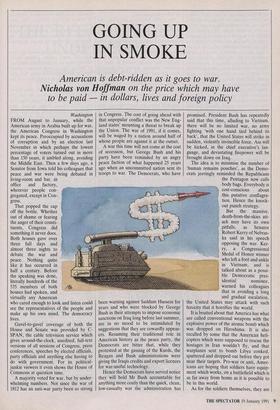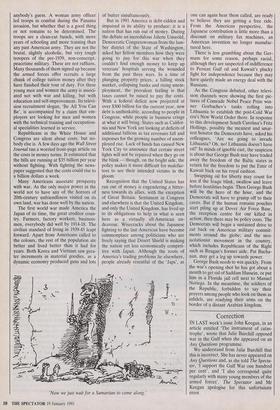GOING UP IN SMOKE
American is debt-ridden as it goes to war.
Nicholas von Hoffman on the price which may have
to be paid — in dollars, lives and foreign policy
Washington FROM August to January, while the American army in Arabia built up for war, the American Congress in Washington kept its peace. Preoccupied by accusations of corruption and by an election last November in which perhaps the lowest percentage of voters turned out in more than 150 years, it ambled along, avoiding the Middle East. Then a few days ago, a Senator from Iowa told his colleagues that peace and war were being debated in living-room and bar, in office and factory, wherever people con- gregated, except in Con- gress.
That popped the cap off the bottle. Whether out of shame or fearing the anger of their consti- tuents, Congress did something it never does. Both houses gave over three full days and almost three nights to debate the war and peace. Nothing quite it like it has occurred in half a century. Before the speaking was done, literally hundreds of the 535 members of both houses had spoken, and virtually any American who cared enough to look and listen could see the representatives of the people and make up his own mind. The democracy lives.
Gavel-to-gavel coverage of both the House and Senate was provided by C- SPAN, the cable television service which gives around-the-clock, unedited, full-text versions of all sessions of Congress, press conferences, speeches by elected officials, party officials and anything else having to do with government. For its political- junkie viewers it even shows the House of Commons at question time.
A majority voted for war, but by under- whelming numbers. Not since the war of 1812 has an anti-war party been so strong in Congress. The cost of going ahead with that unpopular conflict was the New Eng- land states' mounting a threat to break up the Union. The war of 1991, if it comes, will be waged by a nation around half of whose people are against it at the outset.
A war this time will not come at the cost of secession, but George Bush and his party have been reminded by an angry peace faction of what happened 25 years ago when an uncommitted nation sent its troops to war. The Democrats, who have been warning against Saddam Hussein for years and who were blocked by George Bush in their attempts to impose economic sanctions on Iraq long before last summer, are in no mood to be intimidated by suggestions that they are cowardly appeas- ers. Resuming their traditional role in American history as the peace party, the Democrats are bitter that, while they protested at the gassing of the Kurds, the Reagan and Bush administrations were giving the Iraqis credits and export licences for war-useful technology.
Hence the Democrats have served notice they will hold Mr Bush accountable for anything more costly than the quick, clean, low-casualty war the administration has promised. President Bush has repeatedly said that this time, alluding to Vietnam, there will be no limited war, no army fighting 'with one hand tied behind its back', that the United States will strike in sudden, violently invincible force. Ass will be kicked, in the chief executive's lan- guage, and devastating firepower will be brought down on Iraq.
The idea is to minimise the number of `human remains pouches', as the Demo- crats jeeringly reminded the Republicans the Pentagon now calls body bags. Everybody is cost-conscious about this putative conflagra- tion. Hence the knock- out punch strategy.
But the massive, death-from-the-skies att- ack may have its own pitfalls, as Senator Robert Kerry of Nebras- ka said in his speech opposing the war. Ker- ry, a Congressional Medal of Honor winner who left a foot and ankle in Vietnam, and is talked about as a possi- ble Democratic pres- idential nominee, warned his colleagues that in avoiding a long and gradual escalation, the United States may attack with such ferocity that it horrifies the world.
It is bruited about that America has what are called conventional weapons with the explosive power of the atomic bomb which was dropped on Hiroshima. It is also recalled by some that the American heli- copters which were supposed to rescue the hostages in Iran wouldn't fly, and that warplanes sent to bomb Libya conked, sputtered and dropped out before they got near their targets. Pro-war or anti, Amer- icans are hoping that soldiers have equip- ment which works, on a battlefield which is as far away from home as it is possible to be in this world.
As for the soldiers themselves, they are anybody's guess. A woman army officer led troops in combat during the Panama invasion, but whether that is a good thing or not remains to be determined. The troops are a clean-cut bunch, with more years of schooling and more training than any past American army. They are not the brutal, slightly alcoholic, but very tough troopers of the pre-1939, non-conscript, peacetime military. These are not ruffians. Many thousands of them signed up because the armed forces offer recruits a large chunk of college tuition money after they have finished their tour of duty. For these young men and women the army is associ- ated not with war and killing, but with education and self-improvement. Its televi- sion recruitment slogan, 'Be All You Can Be', is accompanied by a claim that em- ployers are looking for men and women with the technical training and occupation- al specialities learned in service.
Republicans in the White House and Congress are silent about costs, but no- body else is. A few days ago the Wall Street Journal ran a worried front-page article on the costs in money terms. It estimated that the bills are running at $35 billion per year without fighting. With fighting the news- paper suggested that the costs could rise to a billion dollars a week.
Many Americans associate prosperity with war. As the only major power in the world not to have any of the horrors of 20th-century unfriendliness visited on its own land, war has done well by the nation.
The first world war made America the Japan of its time, the great creditor coun- try. Farmers, factory workers, business- men, everybody did well by 1914-18. The civilian standard of living in 1939-45 leapt forward. Apart from Americans called to the colours, the rest of the population ate better and lived better than it had for years. Both Korea and Vietnam saw grea- ter increments in material goodies, as a dynamic economy produced guns and lots of butter simultaneously.
But in 1991 America is debt-ridden and impaired in its ability to produce; it is a nation that has run out of money. During the debate an incredulous Jolene Unseold, Democratic Congresswoman from the lum- ber district of the State of Washington, asked her fellow members how they were going to pay for this war when they couldn't find enough money to keep up veterans' hospitals serving the wounded from the past three wars. In a time of plunging property prices, a falling stock market, collapsing banks and rising unem- ployment, the prevalent feeling is that taxes cannot be raised to pay the costs. With a federal deficit now projected at over $300 billion for the current year, new debt is unthinkable, according to people in Congress, while people in business cringe at what it will bring. States such as Califor- nia and New York are looking at deficits of additional billions as tax revenues fall and expenses for the growing number of unem- ployed rise. Lack of funds has caused New York City to announce that certain street lights will not be repaired when they go on the blink — though, on the bright side, the policy makes it more difficult for malefac- tors to see their intended victims in the gloom.
Recognition that the United States has run out of money is engendering a bitter- ness towards its allies, with the exception of Great Britain. Sentiment in Congress and elsewhere is that the United Kingdom, and only the United Kingdom, has lived up to its obligations to help in what• is seen here as a virtually all-American en- deavour. Wisecracks about the Japanese fighting to the last American have become commonplace among politicians who are freely saying that Desert Shield is making the nation yet less economically competi- tive with Japan. Although the roots of America's trading problems lie elsewhere, people already resentful of the `Japs', as Wow we just wait for a Samaritan to come along.' one can again hear them called, are ready to believe they are getting a free ride. From the American perspective, the Japanese contribution is little more than a discount on military fax machines, an American invention no longer manufac- tured here.
There is less grumbling about the Ger- mans for some reason, perhaps racial, although they are suspected of indifference to Persian Gulf oil and Kuwait's plucky fight for independence because they may have quietly made an energy deal with the Russians.
As the Congress debated, other televi- sion channels were showing the first pic- tures of Comrade Nobel Peace Prize win- ner Gorbachev's tanks rolling into Lithuania to establish the post-Cold War era's New World Order there. In response to this development South Carolina's Fritz Hollings, possibly the meanest and smar- test Senator the Democrats have, asked his colleagues, 'Are we going to invade Lithuania? Oh, no! Lithuania doesn't have oil!' In minds of ignoble cast, the suspicion is about that George Bush may have traded away the freedom of the Baltic states in return for the freedom to put the Emir of Kuwait back on his royal cushion.
Swapping oil for liberty may count for less if the Iraqis blink, swallow and leave before hostilities begin. Then George Bush will be the hero of the hour, and the Democrats will have to grump off to their caves. But if the human remains pouches start piling up at Dover Air Force Base, the reception centre for our killed in action, then there may be policy costs. The Democrats will begin a sustained drive to cut back on American military commit- ments around the globe; and the neo- isolationist movement in the country, which includes Republicans of the Right such as Reagan's former aide, Pat Bucha- nan, may get a leg up towards power.
George Bush needs to win quickly. From the war's opening shot he has got about a month to get rid of Saddam Hussein, or put him in a Florida jail cell next to Manuel Noriega. In the meantime, the soldiers of the Republic, forbidden to say their prayers among people who look on them as infidels, are readying their arms on the border of a distant Arabian kingdom.



















































 Previous page
Previous page